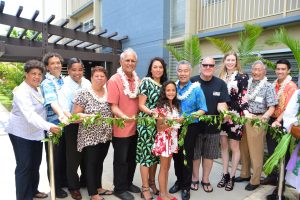Sustainability for our islands means a host of things: protecting our people and our environment, providing living wage jobs and affordable housing, and producing more of our own food with sustainable strategies. This issue describes some of the ways the governor and his administration are working with the community to take action — now and for the future.

AFFORDABLE RENTALS: Gov. Ige, Ahe Group CEO Makani Maeva and her daughter join officials and residents at a recent Waipahu Tower blessing.
Q. Does your definition of sustainability go beyond protecting the environment?
A. Yes, for me sustaining Hawai‘i is part of a bigger mission of changing our economy so we can be more self-reliant. Instead of sending billions of dollars out of state for fuel or food, we need to generate more of our own energy and increase local food production. Then we could keep that money in our economy and have more capital for education, business development and job creation. I do think people are connecting the dots to see that protecting the environment, expanding clean energy, increasing food production and supporting innovation in every sector helps us all.
Q. Over the years, others have talked about the same issues of housing, jobs, education, the environment and food security. What has the Ige administration done differently to move the needle?
A. We’ve encouraged our departments to be “smart risk-takers” if it means delivering better results for taxpayers. In affordable housing, we revamped our processes to support public-private partnerships and made financing tools more attractive to encourage building more affordable units. We’ve reduced homelessness statewide two years in a row because we changed the contracts so more service providers are working together, focusing on moving people to permanent, supportive housing instead of just filling shelter beds. And we’re supporting game-changers like Early College and Hawai‘i’s Promise to give students a head start on higher-paying jobs.
Q. What about concerns over balancing land and water for housing and agriculture?
A. Conditions have changed dramatically from the ’80s when sugar and pineapple were big players and I was a legislator helping to write the state’s water code. Back then, the concern was to protect plantation lands. Now we have an abundance of ag-zoned land all across the state that’s lying fallow. What we need are more people to farm and help for those who want to expand production but can’t afford to take the risk. At our urging, the state’s Water Commission is getting stakeholders together to balance farming and housing needs instead of going to court. Also, with new, efficient greenhouse technology, the conflict between housing development and ag land preservation is no longer such a big issue.
Q. What do you think of the Trump administration’s separation of migrant families? Concerns about the trade war?
A. The separations are an inhumane answer for people desperately seeking a better life. I can’t imagine how terrifying it must be for the children to be in a strange land, separated from their family and not knowing when they’ll be able to see them again. As for the tariffs on foreign goods, business people I talk with say they anticipate pervasive, higher prices on goods. The global supply chain means it’s rare to buy an American manufactured product that has no foreign materials, so the costs will be passed on to consumers.
Q. What has been the most gratifying part of being governor? The most challenging part?
A. The best part is being able to see projects completed and programs working to improve people’s lives. The biggest challenge is you can’t pick and choose your issues. You have a responsibility to make some hard decisions for which there are many differing opinions. In our social media world everyone has a platform, where the minority can sound as loud as the majority. But you can’t please everyone so you just have to make the best decisions you can for the good of the community.